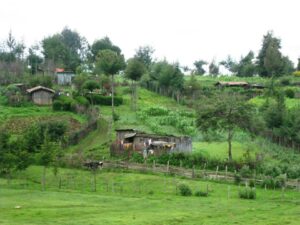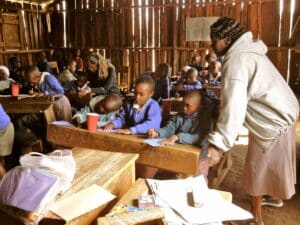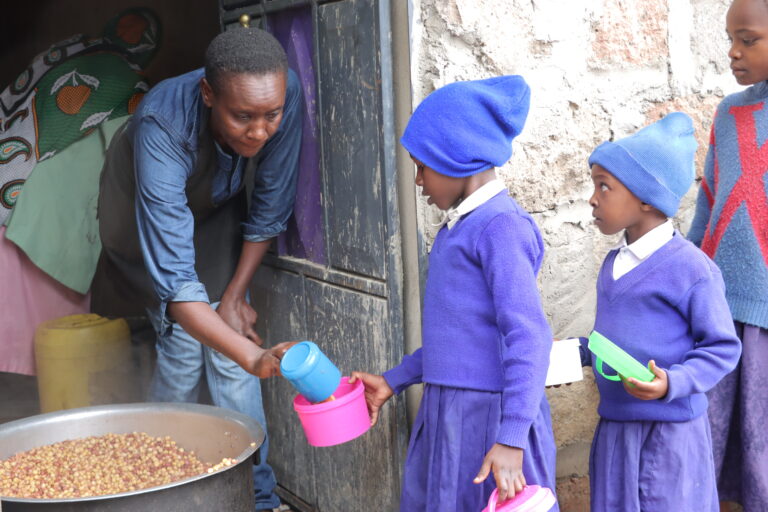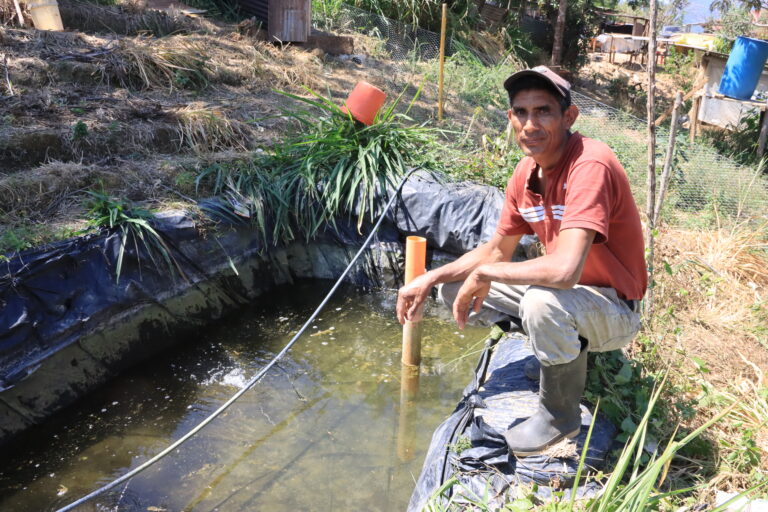Belonging To

Kwambekenya was one of 410 Bridge’s first communities in Kenya. How the community got its name is rooted in its founding a few decades ago.
The people of Kwambekenya lived in the forest just outside the Aberdare National Park. Their high-altitude community is literally at the end of a road that dead ends into the Aberdare National Forest.
For years their primary livelihood was to harvest timber from the forest. The Kenyan government, to save the national forest, abruptly stopped the harvesting of trees and told the community to move out of the forest. They were essentially evicted.
Thankfully, a large plot of land just outside the forest was owned by the Mbekenya family who were willing to sell their land in small ¼ – ½ acre plots. Thus, Kwambekenya was founded.
The community gets its name from “Kwa” meaning “to / belonging to” and “mbekenya” representing the original owner of the land.
A Health Clinic
When we were invited to visit Kwambekenya, we learned that the leadership was strong as were the people. Their shared struggle of being evicted and establishing a new home created a strong sense of community. We also learned their greatest challenge was the 10 km distance to the nearest hospital.
If community members were ill or if women experienced complications during pregnancy, it was virtually impossible to get to the hospital in time. Often the sick would be transported on bicycle or wheelbarrow across bumpy roads. The local 410 Bridge leadership council decided to build a health clinic in their community and asked if we would help.
The first step was securing the land. The leaders felt the community could raise 10-20% of the cost from their next harvest. They would also provide all the unskilled labor and a portion of the materials for the clinic itself.
We agreed to help. We had a small group of donors and church partners who were excited to participate.
Only $800
When the harvest season ended, we had raised our portion of the funding commitment, and we were ready to purchase the land. I visited the community, ready to celebrate this very important first step and move to the building phase.
But at the Leadership Council meeting I learned that the community came up short of their commitment. A severe frost had damaged their crops and they didn’t have the funds needed to purchase the land.
They were short about $800.
The problem wasn’t the amount. I literally had that in my pocket. The problem was that we had donors and church partners on the other side of the bridge thinking we were ready to move forward.
We told them the plan and the timeline. They had patiently waited months for the growing season to end. I couldn’t go back and tell them we had to wait another growing season (six months) before we could move forward. Especially for $800!
This Is Progress
So, I leaned over to our Country Director and whispered in his ear, “I want to cover the difference and move on.”
What transpired after that was a great lesson to me. He looked at me and said, without hesitation, “No!”
As I gave him a questioning glare, he continued. “If you do that, you’ll undermine the entire effort. You’ll slow down the process of community responsibility and ownership. If you do that, we may never regain the community’s understanding that it is their land and their responsibility.”
I pushed back. “I understand. I really do.” [To be clear, I didn’t understand at all.] “But I have donors on my side of the bridge that are expecting me to come home with progress.”
He said plainly, “This is progress. The answer is ‘no’.”
My Flexibility Pants

Like I said, it was a valuable lesson. It was time for me to don my flexibility pants and leave my watch at home.
To create ownership of the solutions, we must work at the community’s pace, not ours. They lead, we follow.
In my mind, I was going home empty handed and would have to explain to our partners that we had taken a step back. But we hadn’t taken a step back.
The real problem was that my mindset needed to change.
A Love Affair With Efficiency
Time has authority in my world. We have a love affair with efficiency. If we can solve a setback with a little more money, we tend to do just that.
But that approach undermines our model of enabling the self-developing capabilities of the people we serve. I am grateful for the lesson.
In the end, the community raised its portion of the funding during the next harvest season. The clinic was built, and it is indigenously sustainable today nearly 15 years after it was built.
So remember, if you ever have a chance to visit a 410 Bridge community, be sure to pack your flexibility pants.
–Kurt
In his book – If You Really Want to Help – Kurt lays out a fresh blueprint for redefining the war on poverty, how to win it, and how we fight the battle together. His book will be released February 28, 2023 and is available for pre-order here.




